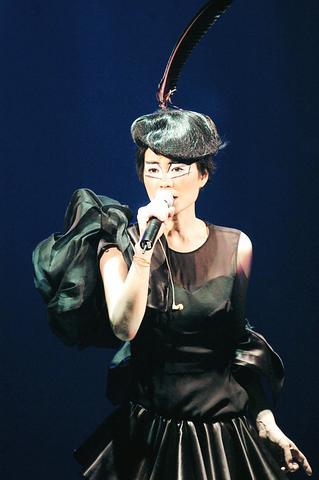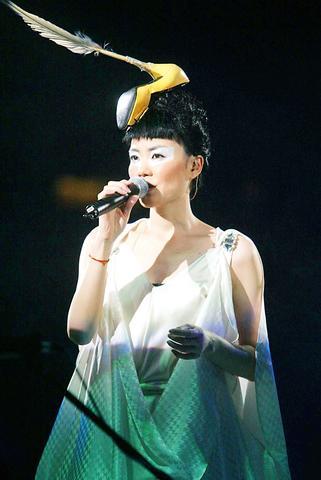Among the female Mando-pop stars, there's a fairly clear division between the girls and the women, and it's not simply an issue of age.
In the girl camp, Jolin Tsai (蔡依林) epitomizes the lasting appeal of the girl next door, with the barely concealed, budding sexuality that she flaunted at a concert last weekend in Taipei.

PHOTO COURTESY OF SILVER FISH
Meanwhile, on the women's side, Faye Wong (王菲) reigns supreme for her grace and captivating unattainability, a type of regal aloofness nurtured over 15 years as a vaguely mysterious superstar whose audiences with the public are carefully staggered and always preceded by much fanfare and excitement. Her concert tomorrow at Taipei's Municipal Stadium is no exception.

PHOTO COURTESY OF SILVER FISH
As of press time, the only tickets remaining are for the "rock and roll" section of the stadium, which is the standing area on the field starting from about 50m from the stage. These are going for NT$1,500 a piece, but before anyone chokes on their tea, those are the medium-priced tickets. All the prime tickets in the NT$3,000 to NT$2,500 range were sold out weeks ago, along with the NT$800 and NT$1,000 tickets. The sales so far ensure a crowd of about 40,000.
Wong generates such massive following by being, first and foremost, one of the most gifted singers in Mando-pop, a talent handed down, she says, by her mother who was a revolutionary opera singer in China. It no doubt also helped that she inherited a 175cm frame and a model's good looks.
Her first album was her self-titled debut when she performed under the name Shirley Wong, released in 1989, less than two years after migrating from her native Beijing to Hong Kong's greener pastures. Since then, she's transformed herself multiple times, first ditching her original stage name in favor of her current one after taking a break in the US between 1991 and 1992, and later taking the path of most Hong Kong pop stars to experiment with movie roles, notably in Wang Kar Wai's (王家衛) Chunking Express (重慶森林) and most recently 2046.
Wong also had a brief fascination for the ethereal music of the Cocteau Twins in the mid-1990s, which manifested itself in three covers of the Scottish band's songs on Wondering Music (胡思亂想, 1994) and collaborations with the band on Impatience (浮躁, 1996), and Faye Wong (快樂不快樂, 1997). The collaborations seemed tailor-made, as Wong shares the same distant-sounding, high-pitched siren voice of the Cocteau Twins' Elizabeth Fraser, and the gauzy aesthetic of the Twins' album covers even made its way onto Wong's album cover art.
The overwhelming Cocteau Twins influence began to wane, though, with the release of Sing and Play (唱游, 1998) and Only Love Strangers (只愛陌生人, 1999), when Wong set off in a more blatantly pop direction. She still retained some of the edge that continued her flirtation with anti-pop status, but the sound became more accessible, and, dare one say it, KTV-friendly. Her most recent album, To Love (將愛, 2003), is a mosh of her two recent artistic tendencies: saccharine pop and daring avant-garde.
By juggling these two styles, Wong's status has only risen over the years. So much so that, even without releasing any new material, she can drop into town and pack a stadium, as she's sure to do tomorrow.
Performance notes:
What: No Faye, No Live
When: Tomorrow, 7pm
Where: Taipei Municipal Stadium, 46 Bade Rd, Sec 1, Taipei (
Tickets: Available at door or through Era ticketing at www.ticket.com.tw. Only tickets for NT$1,500 remain.

The 1990s were a turbulent time for the Chinese Nationalist Party’s (KMT) patronage factions. For a look at how they formed, check out the March 2 “Deep Dives.” In the boom years of the 1980s and 1990s the factions amassed fortunes from corruption, access to the levers of local government and prime access to property. They also moved into industries like construction and the gravel business, devastating river ecosystems while the governments they controlled looked the other way. By this period, the factions had largely carved out geographical feifdoms in the local jurisdictions the national KMT restrained them to. For example,

The remains of this Japanese-era trail designed to protect the camphor industry make for a scenic day-hike, a fascinating overnight hike or a challenging multi-day adventure Maolin District (茂林) in Kaohsiung is well known for beautiful roadside scenery, waterfalls, the annual butterfly migration and indigenous culture. A lesser known but worthwhile destination here lies along the very top of the valley: the Liugui Security Path (六龜警備道). This relic of the Japanese era once isolated the Maolin valley from the outside world but now serves to draw tourists in. The path originally ran for about 50km, but not all of this trail is still easily walkable. The nicest section for a simple day hike is the heavily trafficked southern section above Maolin and Wanshan (萬山) villages. Remains of

With over 100 works on display, this is Louise Bourgeois’ first solo show in Taiwan. Visitors are invited to traverse her world of love and hate, vengeance and acceptance, trauma and reconciliation. Dominating the entrance, the nine-foot-tall Crouching Spider (2003) greets visitors. The creature looms behind the glass facade, symbolic protector and gatekeeper to the intimate journey ahead. Bourgeois, best known for her giant spider sculptures, is one of the most influential artist of the twentieth century. Blending vulnerability and defiance through themes of sexuality, trauma and identity, her work reshaped the landscape of contemporary art with fearless honesty. “People are influenced by

Ten years ago, English National Ballet (ENB) premiered Akram Khan’s reimagining of Giselle. It quickly became recognized as a 21st-century masterpiece. Next month, local audiences get their chance to experience it when the company embark on a three-week tour of Taiwan. Former ENB artistic director Tamara Rojo, who commissioned the ballet, believes firmly that if ballet is to remain alive, works have to be revisited and made relevant to audiences of today. Even so, Khan was a bold choice of choreographer. While one of Britain’s foremost choreographers, he had never previously tackled a reimagining of a classical ballet, so Giselle was